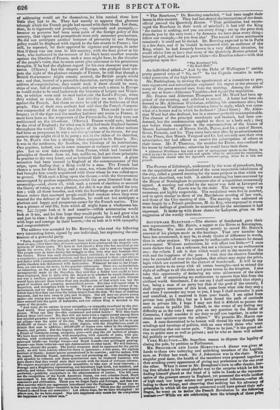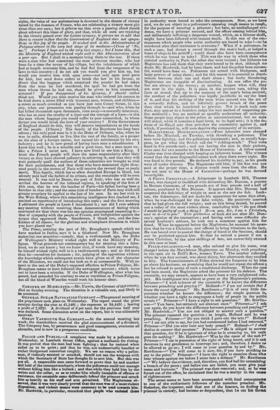SOUTHWARK ELECTION.—The electors of Southwark gave their new representative, Mr.
Harris, a supper at the Horns at Kennington, on Monday. We notice the meeting merely to record Mr. Harris's renewal of his pledges made at the hustings. That new member has been less accustomed, it may be, to study shades of difference in words, than in other matters. We suppose by enthusiastic reformers he meant extravagant. Without enthusiasm, he will effect but little.—" I once more declare that I am a reformer, but not a visionary or an enthusiastic. one : the reform I ask is that which would add to the security of the rich and the happiness of the poor. I wish that the elective franchise may be extended all over the kingdom, that others may enjoy the privi. leges which are exercised by the electors of Southwark. It will be my earnest desire to do away with all rotten boroughs—and to extend the right of suffrage to all the cities and great towns in the kingdom. I also take this opportunity of declaring my utter abhorrence of the slave trade, and of announcing my endeavours to remove that blot from the civilized world. Gentlemen, I do not say I shall accomplish that object; but, being a man of no party but that of the good of the country, I shall support measures of this kind, come from what side they may; and when I surrender my trust to you, I hope I shall surrender it pure and unsullied, as I received it from your hands. I am called from private into public life; • but as I have found the path of rectitude easy in private life, I hope I may not find it difficult to pursue the same course in public life. Indeed, in the event of my feeling any difficulty as to the vote I may give on any question in the House of Commons, I shall consider it my duty to call you together, in order to obtain your opinions upon the subject." We promise Mr. Harris saes cess. A man determined to be honest will thread his way through the windings and turnings of politics, with an ease which those who want that unerring clue can never gain. "Dare to be just," is the grand ad- vice to public men as well as private; and he who so dares will seldom fail publicly or privately. YORK ELECTION.—Mr. Stapylton means to dispute the legality of closing the pole, by petition to Parliament. MR. BROUGHAM AND Loan MORPETH.—A dinner was given at Leeds to these two unbuying and unbribing members of the Legisla. ture, on Friday last week. Sir J. Johnstone was in the chair. With singular good taste, the health of the members were proposed together ; thus avoiding every appearance of giving any preference to the one over the other. When it came to Mr. Brougham's turn to offer thanks, hay ing first alluded in his usual playful way to the surprise which he felt in finding himself placed at the head of a table in Leeds as the represen. tative of the greatest county in England, yet possessed the-while neither of high rank nor large estates nor great personal influence,—after hiding to these things, and observing that nothing but his advocacy of principles in which all the people concurred could have gained their onfa frages, he went on to Sotice the French Revolution in the following I manner While we are celebrating here the triumph of these Fhb! ciples, the voice of our acclamations is drowned in the shouts of victory raised by the freemen of France, who are celebrating a victory more glo. rious than our own; but it grieves me that even a passing cloud should shoot athwart this blaze of glory, and that, while all men are rejoicing in the victory gained over the foulest tyranny, it grieves me to add that there is reason to fear that the Government of England does not sympa- thise in this joy of the people. It wished well to the Administration of Polignac almost in the very last stage of its madness—(Cries of No, *Al.') Perhaps I hope not in the very last stages ; but I know this, that the Ministry of England wished right well to this Administration about a year ago. But I shall in a moment bring them to the test. If there were a man who had committed the most atrocious murder, who had been for a time the terror of his village, but the inhabitants of which had at length overcome him, and he had fled from the vengeance of its laws to this country—I do not ask you would you give him up, but would you receive him with open arms—not only open your ports for him, but send down orders to break the law in his favour, to direct that the baggage which contained the punder he had taken from the man he had murdered, the spoil he had got from the man whose throat he had cut, should be given to him unsearched, untaxed ? If you disapproved of his tyranny, I should rather think not. Would you then receive the man who ordered his cannon to be fired down a street filled with innocent men, women, and children— a street as much crowded as you have just seen Coney Street, in this city, when our procession was passing through it—and who, when he has killed thousands upon thousands, runs away—a cowardly miscreant, who has at once the cruelty of a tiger and the courage of a hare—is this the man whose baggage you would suffer to pass unsearched, in whose favour you would break the laws of your country ? If the Government of England should do this, they will deserve impeachment at the hands of the people. (Cheers.) The family of the Bourbons has long been odious ; the only good man in it is the Duke of Orleans, who, when he was in exile, disdained to live, like the rest of the family, as a pauper o n the alms of a foreign nation, but earned his subsistence by his own industry ; and he is now proud of having been once a schoolmaster. I know him well ; he is a sensible and a good man, but a man more TM.* like a Prince I never saw. I have now lived to see him a King. I trust the French people will show the same magnanimity after their victory as they have showed gallantry in achieving it, and that they will wait patiently until the authors of these calamities are brought to trial for their punishment, and that those who have massacred eight thou- sand people in the streets of Paris will receive the reward they so justly merit. This family, which has so often drenched Europe in blood, has already paid half the forfeit of its crimes, and the remainder will be soon exacted. It was said by Dante, the poet of Italy, who has so well de- scribed the horrors of the infernal regions, in speaking of the first of this race, that he was the butcher of Paris—his father having been a butcher in that city ; and the same title of butcher of Paris may with still greater propriety be applied to the last of his race. In my last visit to the West Riding, where this astonishing intelligence first reached me, I omitted no opportunity of introducing this topic ; and the first morning I addressed the people at Leeds I introduced it ; nor did I ever address any meeting without receiving those demonstrations of feeling which convinced me that there was but one opinion entertained respecting it— that of sympathy with the people of France, and indignation against the tyrant that oppressed them. Gentlemen, I thank you, and the free- holders of all classes, for the glorious and triumphant situation in which you have placed me." The Times, noticing the part of Mr. Brougham's speech which we have marked in Italics, says it is a falsehood. Now Mr. Brougham makes but one assertion—namely, that a twelvemonth ago, the Duke of Wellington's Ministry wished right well to the Ministry of Po- lignac. What grounds our contemporary has for terming this a false- hood, we do not know ; but we know that, if words have any meaning, he himself wished right well to it a twelvemonth ago ; and so did more than he—ourselves for instance ; for, judging of the opposition without the knowledge which subsequent events have given us of the character of the Ministers, we could not but look on it as unreasonable. With re- spect to the test of the Duke's supposed affection to Prince Polignac, Mr. Brougham seems to have followed the newspaper account ; which turns out to have been a mistake. If the Duke of Wellington, after what has passed, had extended his courtesy to one so worthless as Prince Polignac, not all the blood of Waterloo would wash his honour clear.



























 Previous page
Previous page